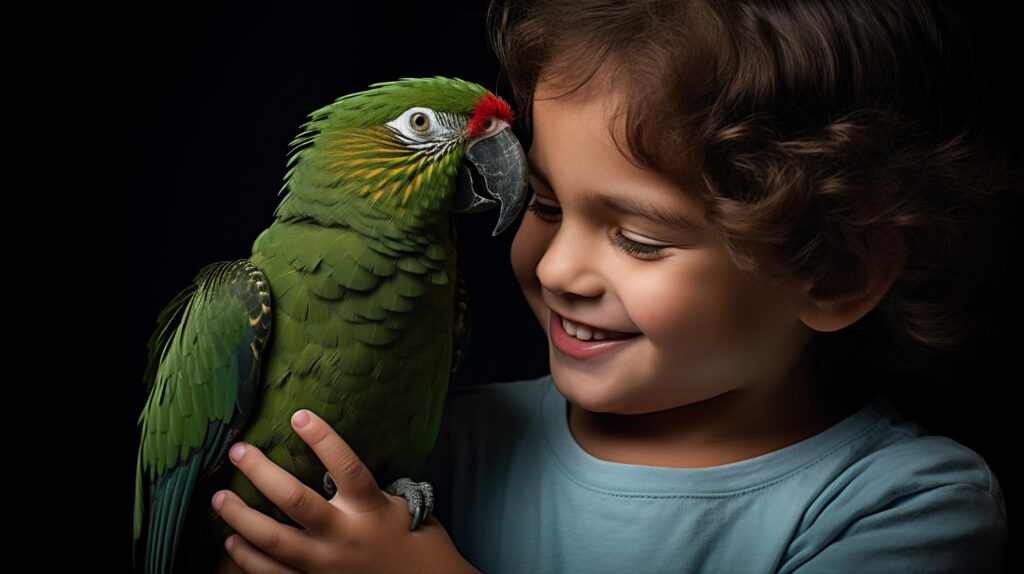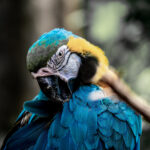Parrot Health: A Comprehensive Guide to Keeping Your Feathered Friend Healthy
Parrots are intelligent, colorful, and social birds that make wonderful companions. However, they require careful attention to their health, as they are prone to various illnesses and conditions that can impact their quality of life. Parrot owners must be vigilant about providing the right diet, environment, mental stimulation, and medical care to ensure their bird remains healthy and happy. This article explores the key aspects of parrot health, including common health problems, preventive care, and signs of illness.
1. Nutrition: The Key to Long-Term Health
A well-balanced diet is the cornerstone of a healthy parrot. Many health problems in parrots stem from poor nutrition, so it is essential to feed them a diet that closely mirrors what they would eat in the wild.
- Pellets as a Staple: High-quality, nutritionally balanced pellets should make up the bulk of your parrot’s diet. Pellets are formulated to provide the essential vitamins and minerals parrots need.
- Fresh Fruits and Vegetables: Fresh produce should be a regular part of your parrot’s meals. Leafy greens, carrots, bell peppers, and fruits like apples and berries are excellent choices. However, avoid giving your parrot avocado, chocolate, caffeine, or foods high in salt, as they are toxic to birds.
- Seeds in Moderation: While seeds are a natural part of a wild parrot’s diet, they should only be offered in moderation. Seed-only diets can lead to obesity and vitamin deficiencies. Seeds are high in fat, which can contribute to liver disease if overconsumed.
- Fresh Water: Clean, fresh water should always be available. Parrots can be sensitive to water quality, so it’s important to change their water daily and clean their bowls to prevent bacterial growth.
2. Common Health Issues in Parrots
Parrots can suffer from a variety of health problems, many of which can be avoided or managed through proper care and early detection. Here are some of the most common health issues in parrots:
- Psittacosis (Parrot Fever): Psittacosis is a bacterial infection caused by Chlamydia psittaci. It can cause respiratory problems, lethargy, loss of appetite, and greenish diarrhea. It is also a zoonotic disease, meaning it can be transmitted to humans. Early detection and antibiotics can effectively treat psittacosis.
- Respiratory Infections: Parrots are susceptible to respiratory infections, especially if they are exposed to cold drafts, mold, or poor ventilation. Symptoms include coughing, sneezing, nasal discharge, and labored breathing. Keeping your parrot’s environment clean and warm can help prevent these infections.
- Feather Plucking: Feather plucking is a behavior where parrots pull out their own feathers, often due to stress, boredom, or underlying health issues such as skin infections or hormonal imbalances. Identifying and addressing the root cause, whether it is environmental, psychological, or medical, is key to stopping feather plucking.
- Aspergillosis: Aspergillosis is a fungal infection that affects the respiratory system. It is caused by the inhalation of mold spores, which can be present in old food, dirty cages, or damp environments. Symptoms include difficulty breathing, lethargy, and weight loss. This condition requires immediate veterinary attention.
- Beak and Feather Disease (PBFD): PBFD is a viral disease that affects the feathers, beak, and immune system of parrots. It is highly contagious and can be fatal. Symptoms include feather loss, beak deformities, and weakened immunity. There is no cure for PBFD, but supportive care can help manage the disease in some cases.
3. Signs of a Healthy Parrot
Knowing what a healthy parrot looks and behaves like can help you spot potential health issues early. Here are some signs that indicate your parrot is in good health:
- Bright, Clear Eyes: A healthy parrot has bright, clear eyes with no discharge or redness.
- Smooth, Clean Feathers: Your parrot’s feathers should be smooth, vibrant, and well-groomed. Dull or fluffed-up feathers may indicate illness.
- Active and Alert: Healthy parrots are active, curious, and engaged with their environment. A sudden change in behavior, such as lethargy or listlessness, could be a sign of illness.
- Normal Droppings: A healthy parrot’s droppings should be firm with a white urate portion and a green or brown fecal part. Watery, discolored, or foul-smelling droppings can indicate health problems.
- Good Appetite: Parrots with a healthy appetite will eagerly eat their food and show interest in treats. A sudden loss of appetite is a red flag and should be investigated immediately.
4. Preventive Health Care
Preventive care is crucial for keeping your parrot healthy and minimizing the risk of illness. Regular veterinary checkups and proper hygiene are key components of preventive care.
- Veterinary Visits: Annual checkups with an avian veterinarian are important for monitoring your parrot’s health. During these visits, your vet can perform routine tests to check for parasites, infections, and other health concerns.
- Cage Cleaning: Keeping your parrot’s cage clean is essential for preventing infections and parasites. Clean food and water dishes daily, change cage liners, and disinfect perches and toys regularly. Avoid using cleaning products with harsh chemicals that can be harmful to birds.
- Grooming: Parrots need regular grooming to stay healthy. This includes trimming their nails and beak as needed, providing opportunities for bathing or misting to keep their feathers clean, and ensuring they have access to safe chewing toys to maintain beak health.
- Environmental Enrichment: Mental stimulation is vital for a parrot’s well-being. A lack of mental stimulation can lead to stress, boredom, and behavioral issues like feather plucking. Provide a variety of toys, puzzles, and opportunities for foraging to keep your parrot mentally engaged.
5. Mental Health and Social Interaction
Parrots are highly social creatures that thrive on interaction with their owners and other birds. Neglecting their social needs can lead to loneliness, depression, and behavioral problems.
- Time Outside the Cage: Parrots need time outside their cage to explore, stretch their wings, and interact with their environment. Provide your parrot with a safe, supervised space where they can fly or move freely.
- Bonding and Interaction: Spend quality time with your parrot every day. Parrots enjoy being talked to, playing games, and even learning tricks. Social interaction helps reduce stress and strengthens the bond between you and your bird.
- Companionship: Some parrot species are particularly social and may benefit from the companionship of another parrot. However, careful introductions are necessary to avoid aggression or territorial behavior.
6. Recognizing Signs of Illness
Parrots are good at hiding signs of illness, a trait that has evolved to protect them from predators in the wild. Because of this, it is important for parrot owners to be vigilant and recognize subtle changes in behavior or appearance that may indicate a health problem. Here are some signs that your parrot may be ill:
- Changes in droppings (color, consistency, or frequency)
- Lethargy or reluctance to move
- Loss of appetite or sudden weight loss
- Difficulty breathing, wheezing, or tail bobbing
- Discharge from the eyes, nose, or beak
- Vomiting or regurgitation
- Fluffed-up feathers for extended periods
- Changes in vocalization or behavior
If you notice any of these symptoms, contact an avian veterinarian immediately. Early detection and treatment can make a significant difference in your parrot’s recovery.
Conclusion
Maintaining your parrot’s health requires a combination of proper nutrition, environmental enrichment, preventive care, and regular veterinary attention. By staying informed about common health issues and paying attention to any changes in your parrot’s behavior or appearance, you can ensure that your feathered companion enjoys a long, healthy, and happy life. Remember that parrots are highly sensitive creatures, and their well-being depends on the care and attention you provide.


